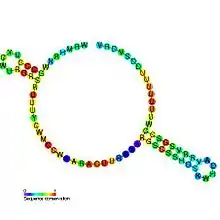suhB
suhB, also known as mmgR (makes more granules regulator), is a non-coding RNA found multiple times in the Agrobacterium tumefaciens genome and related alpha-proteobacteria.[1] Other non-coding RNAs uncovered in the same analysis include speF, ybhL, metA, and serC.[1]
| suhB | |
|---|---|
 Predicted secondary structure and sequence conservation of suhB | |
| Identifiers | |
| Symbol | suhB |
| Rfam | RF00519 |
| Other data | |
| RNA type | Gene; sRNA |
| Domain(s) | Bacteria |
| GO | GO:0006353 GO:0003715 |
| SO | SO:0000655 |
| PDB structures | PDBe |
Several studies in Sinorhizobium meliloti showed that the suhB element is indeed a non-coding RNA. It was first detected by Northern blot and called Sm8RNA,[2] then in an RNAseq study and referred to as SmelC689.[3]
The mutant (lacking the small RNA) phenotype's cytoplasm contains a higher content of polyhydroxybutyrate (PBH) storage granules than the wild type strain.[4] The sRNA is required to limit the PBH intracellular accumulation when the nitrogen-fixing Sinorhizobium meliloti is converting surplus carbon to nitrogen [this needs to be modified, carbon cannot be converted to nitrogen]. Further study confirmed that suhB fine-tunes the regulation of PBH storage.[5]
Northern blot confirmed the expression of the sRNA in other rhizobia species. suhB homologues were found in most alpha-proteobacteria. The Rho-independent terminator and a single-stranded region 10-mer (UUUCCUCCCU) are completely conserved. Hence, it was proposed to define a new family of alpha-proteobacterial sRNA, alpha-r8, of which suhB is a member.[6]
RNA binding protein Hfq binds and stabilises suhB.[7][8] Expression of the mmgR gene was shown to be controlled by nitrogen (N).[9] Further study[10] has shown that the regulatory proteins NtrC may be required for expression of the suhB gene upon N limitation. Under carbon (C) limitation, suhB transcription is repressed by AntiA.[10]
suhB is also present in Sphingopyxis granuli strain TFA, [11] an alpha-proteobacterium that uses the solvent tetralin as an energy source ([12] and references therein). suhB has been detected as a 61 nt long sRNA by Northern blot in TFA cells growing at high rates. β-galactosidase activity of a PsuhB::lacZ fusion confirmed the lower expression of suhB in TFA cells growing at low rates. A mutant lacking suhB expresses the thn genes (tetralin degradation) even in the presence of a preferential carbon source (catabolite repression conditions). This phenotype is due to the release of the negative effect of suhB on ThnR translation. Hfq is also involved in the interaction between suhB and the 5′ UTR thnR mRNA, which results in thn gene repression in catabolite repression conditions.[11]
See also
References
- Corbino KA, Barrick JE, Lim J, Welz R, Tucker BJ, Puskarz I, Mandal M, Rudnick ND, Breaker RR (2005). "Evidence for a second class of S-adenosylmethionine riboswitches and other regulatory RNA motifs in alpha-proteobacteria". Genome Biology. 6 (8): R70. doi:10.1186/gb-2005-6-8-r70. PMC 1273637. PMID 16086852.
- Valverde C, Livny J, Schlüter JP, Reinkensmeier J, Becker A, Parisi G (September 2008). "Prediction of Sinorhizobium meliloti sRNA genes and experimental detection in strain 2011". BMC Genomics. 9: 416. doi:10.1186/1471-2164-9-416. PMC 2573895. PMID 18793445.
- Schlüter JP, Reinkensmeier J, Daschkey S, Evguenieva-Hackenberg E, Janssen S, Jänicke S, Becker JD, Giegerich R, Becker A (April 2010). "A genome-wide survey of sRNAs in the symbiotic nitrogen-fixing alpha-proteobacterium Sinorhizobium meliloti". BMC Genomics. 11: 245. doi:10.1186/1471-2164-11-245. PMC 2873474. PMID 20398411.
- Lagares, A (2015). The biological role of the small regulatory RNA Sm8 in free living and symbiotic Sinorhizobium meliloti. PhD Thesis; Universidad Nacional de La Planta, Argentina.
- Lagares A, Linne U, Becker A, Valverde C (April 2017). "Trans-Encoded Small RNA MmgR". Journal of Bacteriology. 199 (8). doi:10.1128/JB.00776-16. PMC 5370414. PMID 28167519.
- Lagares A, Roux I, Valverde C (June 2016). "Phylogenetic distribution and evolutionary pattern of an α-proteobacterial small RNA gene that controls polyhydroxybutyrate accumulation in Sinorhizobium meliloti". Molecular Phylogenetics and Evolution. 99: 182–193. doi:10.1016/j.ympev.2016.03.026. PMID 27033949.
- Torres-Quesada O, Reinkensmeier J, Schlüter JP, Robledo M, Peregrina A, Giegerich R, Toro N, Becker A, Jiménez-Zurdo JI (2014). "Genome-wide profiling of Hfq-binding RNAs uncovers extensive post-transcriptional rewiring of major stress response and symbiotic regulons in Sinorhizobium meliloti". RNA Biology. 11 (5): 563–579. doi:10.4161/rna.28239. PMC 4152363. PMID 24786641.
- Sobrero P, Valverde C (September 2011). "Evidences of autoregulation of hfq expression in Sinorhizobium meliloti strain 2011". Archives of Microbiology. 193 (9): 629–639. doi:10.1007/s00203-011-0701-1. PMID 21484295. S2CID 7364873.
- Ceizel Borella G, Lagares A, Valverde C (May 2016). "Expression of the Sinorhizobium meliloti small RNA gene mmgR is controlled by the nitrogen source". FEMS Microbiology Letters. 363 (9): fnw069. doi:10.1093/femsle/fnw069. PMID 27010014.
- Ceizel Borella G, Lagares A, Valverde C (January 2018). "Expression of the small regulatory RNA gene mmgR is regulated negatively by AniA and positively by NtrC in Sinorhizobium meliloti 2011". Microbiology. 164 (1): 88–98. doi:10.1099/mic.0.000586. PMID 29214973.
- García-Romero, Inmaculada; Förstner, Konrad U.; Santero, Eduardo; Floriano, Belén (2018-09-14). "SuhB, a small non-coding RNA involved in catabolite repression of tetralin degradation genes in Sphingopyxis granuli strain TFA". Environmental Microbiology. 20 (10): 3671–3683. doi:10.1111/1462-2920.14360. ISSN 1462-2912. PMID 30033661. S2CID 51707650.
- Lopez-Sanchez, A.; Floriano, B.; Andujar, E.; Hernaez, M. J.; Santero, E. (2009-11-06). "Tetralin-Induced and ThnR-Regulated Aldehyde Dehydrogenase and -Oxidation Genes in Sphingomonas macrogolitabida Strain TFA". Applied and Environmental Microbiology. 76 (1): 110–118. doi:10.1128/aem.01846-09. ISSN 0099-2240. PMC 2798658. PMID 19897762.